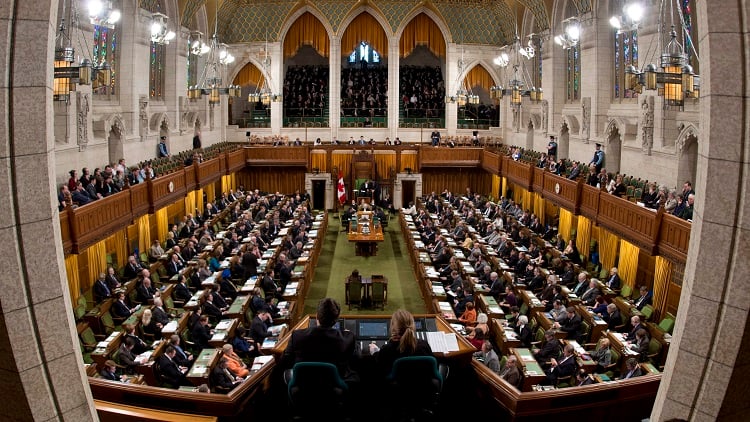
On Thursday evening, the Conservative members of the public safety committee voted to overrule the chair of the committee on a procedural ruling and then voted to impose on the committee a schedule for hearings on Bill C-51, the government’s anti-terror act.
In overruling the chair, the Conservatives have opened themselves up to a formal complaint from the NDP that the Speaker will have to rule on—see here for the submission NDP House leader Peter Julian made on Friday and here for Government House leader Peter Van Loan’s response. But, barring the Speaker’s intervention and further filibustering by the NDP, the Conservatives have set a schedule of nine meetings to study C-51.
The Globe’s headline writer subsequently announced this as “Conservatives agree to more scrutiny,” while the Citizen declared “Conservatives extend anti-terror bill hearings,” which at least demonstrates the value of opening any negotiation with a very low offer. The government’s initial offer of four meetings was basically insulting, but it did turn what might have otherwise been an opening bid (nine meetings) into a concession to “more” scrutiny.
For the sake of comparison, Bill C-36, the anti-terrorism act that the Liberals introduced in the fall of 2001, was studied at committee over the course of 18 meetings, covering approximately 40 hours of hearings. So C-51 is currently scheduled to receive about half as much scrutiny.
That’s made even more glaring by the fact that while the government apparently wants the committee study concluded by March 31, the committee won’t hold any hearings this coming week—the House of Commons is adjourned for the week, but the committee could have met. The NDP apparently offered to sit this week and on weekends. (In 2001, the justice committee completed 19 meetings in the space of 33 days.)
Of course, as I wrote last week, the amount of committee study would matter even more if we could reasonably imagine that committee members, particularly of the governing party, were reasonably free to take what they hear and decide for themselves whether to apply it to the bill. But in the current context it’s hard to see committees as much more than extensions of government and party doctrine. And in that situation, the extent of committee study might be best understood as opportunity to generate the sort of political and public concern necessary to convince the government that it is better off compromising (as arguably happened with the government’s so-called Fair Elections Act).
In that case, limiting the study to nine meetings—in which experts will have limited time to testify—over three weeks is a victory for the government. (Not including the clause-by-clause review of the bill, the Fair Elections Act was subject to 15 meetings of study.)
Those nine meetings will at least bring to Parliament a debate that is being had more robustly elsewhere.
Craig Forcese and Kent Roach, law professors at the universities of Ottawa and Toronto respectively, have authored a series of five background papers to explain their concerns with Bill C-51: specifically, Forcese and Roach have looked at the proposed restriction on speech, the powers to be given to CSIS to disrupt perceived threats, the allowance for information sharing between government departments, the concept of terrorist propaganda and the issue of oversight for our national security agencies.
On his own, Forcese has also written about what C-51 could mean for public protest and civil disobedience. Grand Chief Stewart Phillip, president of the Union of B.C. Indian Chiefs, says he thinks he would be labelled a terrorist for his efforts to protest pipeline projects in British Columbia.
Former prime ministers Jean Chrétien, Paul Martin, John Turner and Joe Clark, along with five former Supreme Court justices and two former privacy commissioners, have called for the government’s national security efforts to be subjected to independent oversight and enhanced review. The CBC has written about the lack of resources afforded to the Security Intelligence Review Committee, the government-appointed body charged with reviewing the actions of CSIS. York professor and former SIRC chair Ron Atkey has both defended the amount of oversight that would exist under C-51 and called for a special parliamentary committee. The University of Ottawa’s Philippe Lagasse has looked at the question of parliamentary oversight.
One hundred academics have written an open letter to MPs (pdf) to express their concerns with the information-sharing provisions, the new restriction on advocating for or encouraging terrorism, the new powers for CSIS and the lack of oversight.
The federal privacy commissioner has so far issued an initial statement on C-51, while Michael Geist has written about the privacy implications of the bill.
Amnesty International Canada, the B.C. Civil Liberties Association, the Canadian Civil Liberties Association, the Canadian Muslim Lawyers Association, the International Civil Liberties Monitoring Group, La Ligue des Droits et Libertés and the National Council of Canadian Muslims are calling for the bill to receive more extensive study.
Opposite those views, Ray Boisvert, a former CSIS official, and S.A. McCartan, a lawyer with the attorney general’s office in Ontario, have defended the necessity of some of C-51’s measures.
(I’ll happily add to this reading list if any other links are sent my way, though I’ve intentionally excluded newspaper editorials and columnists.)
To what degree Parliament is able or willing to directly address all of this remains to be seen.